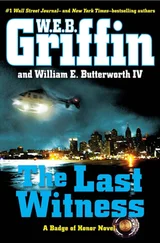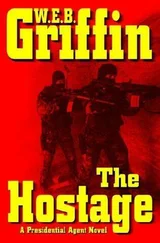W. Griffin - The shooters
Здесь есть возможность читать онлайн «W. Griffin - The shooters» весь текст электронной книги совершенно бесплатно (целиком полную версию без сокращений). В некоторых случаях можно слушать аудио, скачать через торрент в формате fb2 и присутствует краткое содержание. Жанр: Триллер, на английском языке. Описание произведения, (предисловие) а так же отзывы посетителей доступны на портале библиотеки ЛибКат.
- Название:The shooters
- Автор:
- Жанр:
- Год:неизвестен
- ISBN:нет данных
- Рейтинг книги:5 / 5. Голосов: 1
-
Избранное:Добавить в избранное
- Отзывы:
-
Ваша оценка:
- 100
- 1
- 2
- 3
- 4
- 5
The shooters: краткое содержание, описание и аннотация
Предлагаем к чтению аннотацию, описание, краткое содержание или предисловие (зависит от того, что написал сам автор книги «The shooters»). Если вы не нашли необходимую информацию о книге — напишите в комментариях, мы постараемся отыскать её.
The shooters — читать онлайн бесплатно полную книгу (весь текст) целиком
Ниже представлен текст книги, разбитый по страницам. Система сохранения места последней прочитанной страницы, позволяет с удобством читать онлайн бесплатно книгу «The shooters», без необходимости каждый раз заново искать на чём Вы остановились. Поставьте закладку, и сможете в любой момент перейти на страницу, на которой закончили чтение.
Интервал:
Закладка:
On the wall behind him was an oil portrait of Major General Bogardus S. Cairns, for whom the airfield was named. General Cairns, a West Pointer and at the time the commanding general of Fort Rucker, had crashed to his death in an H-13 Sioux helicopter on 9 December 1958. There was an unpleasant story that the crash had been due to General Cairns's failure to turn on his aircraft's pitot heat.
True or not, Colonel Edmonds did not like the story. It tended to detract from the positive image of Army Aviation, and Colonel Edmonds considered himself to be probably the most important guardian of that image. He was the information officer of the Army Aviation Center and Fort Rucker, Alabama.
A year before, the fact that Colonel Edmonds had been granted a bachelor of fine arts degree in journalism by Temple University had come to light when personnel officers in the Pentagon were reviewing his records to see what could be done with him now that some sort of unpronounceable inner-ear malady had caused him to fail his annual flight physical examination and he could no longer be assigned to flight duty.
Finding a round peg for the round hole had pleased both the personnel officers and Colonel Edmonds. He had been afraid, now that he was grounded, that he would be assigned to some maintenance billet, or some supply billet, or wind up in some other nothing assignment, like dependent housing officer.
Being the information officer for the Army Aviation Center and Fort Rucker was a horse of an entirely different hue. He had always believed he had a flair for journalism and the written word, and had often wondered if he had made the right decision in staying in the Army after his compulsory-after-ROTC five-year initial tour. He could have gotten out and tried his hand as a journalist. Or perhaps even as a novelist.
His experience since he'd become the IO had confirmed his opinion of his ability as a journalist. Surprising most his staff-made up of half civilian, half military-instead of just sitting behind his desk supervising things and reviewing press releases to make sure they reflected well on Army Aviation, he had gotten right down to his new profession and gotten his hands dirty.
That was to say, he took it upon himself to write some of the stories that would be published in The Army Flier, the base newspaper, or sent out as press releases. Only the important stories, of course, not the run-of-the-mill pieces.
He was on such a yarn today, one that he intended to run on page one of The Army Flier, and one he was reasonably sure would be printed in newspapers across the land. In his judgment, it had just the right mixture of human interest, military history, and a little good old-fashioned emotion. And, of course, it could not help but burnish the image of Army Aviation and indeed the Army itself.
A sergeant walked up to him.
"Sir?"
Edmonds turned to look at him and nodded.
"Colonel, that Mohawk you've been looking for just turned on final."
"And it will park on the tarmac here?"
"Yes, sir. It's a Blue Flight aircraft, Colonel. They always park here."
"Thank you, Sergeant."
"Yes, sir."
Blue Flight was the name assigned to a special function of the Aviation School's flight training program. If, for example, it was determined for some reason that a nonflying field-grade officer-sometimes a major, most often a lieutenant colonel-needed to learn how to fly, he was sent to Rucker and assigned to Blue Flight.
He-or she, as the case might be-was then subjected to what amounted to a cram course in flying.
This was not to suggest that the course of instruction was less thorough in any way than the regular flight training programs of the Aviation School. If anything, Blue Flight instruction-the best instructors were assigned temporarily to Blue Flight as needed-might just be a little better than that offered by the school.
As Colonel Edmonds thought of it, there were several factors driving the philosophy of Blue Flight instruction. High among them was the realization that it was in the Army's interest to send a senior officer student back as a fully qualified pilot to whatever assignment had necessitated that he or she become a pilot as quickly as possible.
Further, if the Army felt an officer in midcareer needed to be a pilot, it made little sense to send them to Rucker only to have them fail the course of instruction. With this in mind, Blue Flight students were tutored, rather than simply taught. It was in the Army's interest that they earn their wings.
While most Blue Flight students were majors or lieutenant colonels, there were exceptions at both ends of the rank hierarchy. Most of these officers were colonels, but there was-far less commonly-the occasional captain or even lieutenant.
In the case of the junior officers, they were most often aides-de-camp to general officers who were already qualified rotary-wing aviators. They were assigned to Blue Flight for transition into fixed-wing aircraft. It made sense to have an aide-de-camp who could fly his general in both a helicopter and in the C-12 Huron, a twin turboprop, used to fly senior officers around.
"Huron" was the Army's name for the Beechcraft Super King Air. It annoyed Colonel Edmonds that Army Aviators almost invariably called the aircraft the King Air rather than the Huron, but he couldn't do much about it except ensure that the term "King Air" never appeared in news stories emanating from his office.
Such a junior officer-this one a lieutenant, a general officer's aide-de-camp sent to Blue Flight for transition training into the C-12 Huron-was to be the subject of the story Colonel Edmonds planned to write today.
Colonel Edmonds was more than a little annoyed that he had had to dig up the story himself. He should have been told, not have had to hear a rumor and then run down the rumor.
He had happened to mention this to the post commander, when he suggested to the general that if he were to release a photograph of the general standing together with the lieutenant before a building named for the lieutenant's father, it would more than likely be printed widely and reflect well upon Army Aviation and the Army itself.
Two months before, Colonel Edmonds had thought he was onto another story, one just as good, perhaps, as the one he was onto today. That one, however, hadn't worked out.
What had happened was that Colonel Edmonds had seen a familiar name on the bronze dedicatory plaque of the building. He had inquired of Brigadier General Harold F. Wilson, deputy commander of the Army Aviation Center and Fort Rucker, if there was any connection between himself and Second Lieutenant H. F. Wilson, whose name was on the dedicatory plaque.
It had been too much to hope for, and asking General Wilson had been a mistake.
"Colonel, I have been asked that question many times before," the general had said. "I will tell you what I have told everyone else who's asked it: Don't ask it again, and whenever you hear that rumor someplace else, repeat this conversation of ours."
Obviously, General Wilson, himself a highly decorated Army Aviator, was anxious not to bask in the reflected glory of another hero who happened to have a similar name.
With that encounter with General Wilson in mind-and knowing the odds were that General Wilson would not be enthusiastic about what he had in mind-Colonel Edmonds had taken his idea directly to Major General Charles M. Augustus, Jr., the commanding general of the Army Aviation Center and Fort Rucker.
General Augustus, not very enthusiastically, agreed that it was a good idea, and told Edmonds to set it up. But he didn't respond to Edmonds's complaint that he had not been advised, as he should have been, that the lieutenant was a member of Blue Flight.
Edmonds further suspected that the Blue Flight people were either unaware of what the lieutenant was doing or didn't care.
Читать дальшеИнтервал:
Закладка:
Похожие книги на «The shooters»
Представляем Вашему вниманию похожие книги на «The shooters» списком для выбора. Мы отобрали схожую по названию и смыслу литературу в надежде предоставить читателям больше вариантов отыскать новые, интересные, ещё непрочитанные произведения.
Обсуждение, отзывы о книге «The shooters» и просто собственные мнения читателей. Оставьте ваши комментарии, напишите, что Вы думаете о произведении, его смысле или главных героях. Укажите что конкретно понравилось, а что нет, и почему Вы так считаете.











